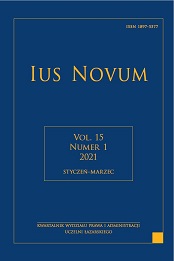Abstract
The article verifies the meaning of a scene of crime and the division into territorial and exterritorial conduct when determining the scope of Polish jurisdiction in criminal cases. The deliberations are theoretical and dogmatic in nature. They are based on the proposals put forward in the doctrine of international public law within its broad sense, in particular international criminal law, and take into account Criminal Code regulations in force. The analysis leads to a conclusion that in the current reality, in the face of the development of the world wide web, the tendency to redefine the concept of national borders and their role as a factor limiting the freedom of cross-border activities and the development of supranational societies, there are grounds to challenge the function of a scene of crime as a factor determining the scope of Polish jurisdiction in criminal cases. It is proposed to consider the introduction of additional substantive criteria allowing determination of ius puniendi that Poland should be entitled to regardless of the territory where a given act has been committed.
References
Berman P.S., Globalisation of Jurisdiction, „University of Pennsylvania Law Review” 2002, nr 2.
Buxbaum H.L., Territory, Territoriality, and the Resolution of Jurisdictional Conflict, „American Journal of Comparative Law” 2009, nr 3.
Elkins J., Beyond „Beyond the State” Rethinking law and Globalization, w: A. Sarat, L. Douglas, M. Umphrey (red.), Law without Nations, Stanford 2011.
Florey K., Resituating Territoriality, „George Mason Law Review” 2019, nr 27.
Gardocki L., Zagadnienia internacjonalizacji odpowiedzialności karnej za przestępstwa popełnione za granicą, Warszawa 1979.
Gardocki L., Zagadnienia teorii kryminalizacji, Warszawa 1990.
Gardocki L., Gardocka T., Majewski Ł., Prawo karne międzynarodowe zarys systemu, Warszawa 2017.
Interview with Nadine Strossen, w: M. Herz, P. Molnar (red.), The Content and Context of Hate Speech. Rethinking Regulation and Responses, Cambridge 2012.
Maillart J.B., The Limits of Subjective Territorial Jurisdiction in The Context Of Cybercrime, „Era Forum” 2019, nr 19.
Nazar-Gutowska K., Groźba bezprawna w polskim prawie karnym, Warszawa 2012.
Płachta M., Konflikty jurysdykcyjne w sprawach karnych: pojęcie, geneza i środki zaradcze, „Prokuratura i Prawo” 2010, nr 11.
Ryngaert C., An Urgent Suggestion to Pour Old Wine into New Bottles: Comment on “A New Jurisprudential Framework for Jurisdiction”, „American Journal of International Law Unbound” 2015, nr 109.
Ryngaert C., Jurisdiction in International Law, Oxford 2015.
Ryngaert C., Territorial Jurisdiction Over Cross-frontier Offences: Revisiting a Classic Problem of International Criminal Law, „International Criminal Law Review” 2009, nr 1.
Siwicki M., Pojęcie locus delicti i zasady jurysdykcji karnej w ujęciu prawnoporównawczym, cz. I, „Europejski Przegląd Sądowy” 2011, nr 9.
Svantesson D.J.B., A New Jurisprudential Framework for Jurisdiction: Beyond the Harvard Draft, „American Journal of International Law Unbound” 2015, nr 109.
Svantesson D.J.B., Solving the Internet Jurisdiction Puzzle, Oxford 2017.
Szigeti P.D., The Illusion of Territorial Jurisdiction, „Texas International Law Journal” 2017, nr 3.
Turner J.I., The Expressive Dimension of EU Criminal Law, „The American Journal of Comparative Law” 2012, nr 60.
Wróbel W., Zoll A., Polskie prawo karne, część ogólna, Kraków 2013.
Zając D., Odpowiedzialność karna za czyny popełnione za granicą, Kraków 2017.

